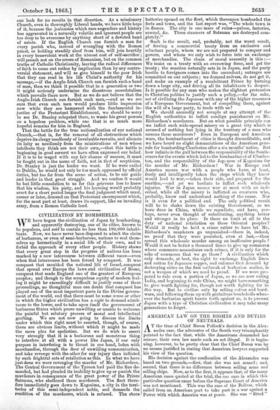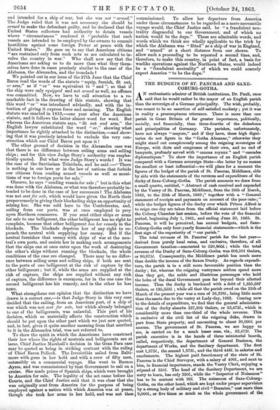AMERICAN LAW ON THE RIGHTS AND DUTIES • OF NEUTRALS.
A T the time of Chief Baron Pollock's decision in the Alex- 11 andra case, the advocates of the South very triumphantly pointed to the fact that, while the Americans demanded her seizure, their own law made such an act illegal. It is begin- ning, however, to be pretty clear that the Chief Baron was by no means justified in stating that American lawyers supported his view of the question.
His decision against the confiscation of the Alexandra was based on two grounds,—first, that she was not armed ; and, second, that there is no difference between selling arms and selling ships. Now, as to the first, it appears that, of the many American cases quoted at the trial, the one case in which this particular question came before the Supreme Court of America was not mentioned. This was the case of the Bolivar, which sailed from an American port to take part in a war against a Power with which America was at peace. She was " fitted'' and intended for a ship of war, but she was not " armed." The Judge ruled that it was not necessary she should be armed to make the defendant guilty, and he declared that the United States collectors had authority to detain vessels where " circumstances " rendered it " probable that such vessels are intended to be employed by the owners to commit hostilities against some foreign Power at peace with the United States." He goes on to say that American citizens " are restrained only from such acts as are calculated to in- volve the country in war." Who shall now say that the Americans are asking us to do more than what they them- selves have done in cases precisely similar to the case of the Alabama, the Alexandra, and the ironclads ff We pointed out in our issue of the 27th June that the Chief Baron read the words of the statute " equip, furnish, fit out, or arm," as if " or " was equivalent to " and "; so that if the ship were only equipped and not armed as well, no offence was committed. Now, we have to call attention to a re- markable fact in the drawing of this statute, showing that this word " or " was introduced advisedly, and with the in- tention of giving it express force and meaning. The English statute was enacted in 1819,—one year after the American statute, and it follows the latter almost word for word. But whereas the American statute says, " fit out and arm," the .English lawyer substituted the word "or," showing what importance he rightly attached to the distinction,—and show- ing that it was precisely intended to exclude the very con- struction which our Chief Baron put upon it 1 The other ground of decision in the Alexandra case was that there is no difference between selling arms and selling ships ; and for this view Judge Story's authority was empha- tically quoted. But what were Judge Story's words ? It was the case of the Santissima Trinidada, and he said :—" There is nothing in our laws or in the law of nations that forbids our citizens from sending armed vessels as well as muni- tions of war to foreign ports for sale." Observe, he says " sending vessels for sale ;" but is this what -was done with the Alabama, or what was therefore probably in- tended to be done in the case of her successors V The Alabama 'was not sent for sale, which would have given the North their properremedyin giving their blockading ships an opportunity of seizing her. She was sold here to the Confederates, and, sailing from our ports, was at once employed to prey upon Northern commerce. If you send either ships or arms for sale to one belligerent, the other belligerent has no right to complain, because that other belligerent has her remedy in the blockade. The blockade deprives her of any right to re- proach the neutral with supplying her enemy. But if the neutral furnishes that enemy with ships of war at the neu- tral's own ports, and assists her in making such arrangements that the ships can at once enter upon the work of destroying the other's ships without running the blockade, the whole conditions of the case are changed. There may be no differ- ence between selling arms and selling ships, if both are sent to the ports of one belligerent at the risk of capture by the other belligerent ; but if, while the arms are supplied at the risk of capture, the ships are supplied without any risk of capture, the difference is enormous, for in the one case the second belligerent has his remedy, and in the other he has none.
What strengthens our opinion that the distinction we have drawn is a correct one,—is that Judge Story in this very case decided that the sailing, from an American port, of a ship of war which was not sent for sale, but which already belonged to one of the belligerents, was unlawful. This part of his decision, which so materially affects the construction which should be put upon the other part which we just now quoted, and, in fact, gives it quite another meaning from that ascribed to it in the Alexandra trial, was not referred to.
To show the spirit in which the Americans have construed their law where the rights of neutrals and belligerents are at issue, Chief Justice Marshall's decision in the Gran Para case may bs quoted as being in striking contrast with the ruling of Chief Baron Pollock. The Irresistible sailed from Balti- more with guns in her hold and with a crew of fifty men, ostensibly on a commercial voyage. She went to Buenos .Ayres, and was commissioned by that Government to sail on a 'cruise. She made prizes of Spanish ships, which were brought to America for sale. The legality of the act came before the Courts, and the Chief Justice said that it was clear that she was originally sent from America for the purpose of being employed against a nation with which America was at peace, though she took her arms in her hold, and was not then commissioned. To allow her departure from America under these circumstances to be regarded as a mere mercantile voyage would, the Chief Justice said, be " a fraudulent neu- trality disgraceful to our Government, and of which no nation would be the dupe." These are admirable words, and words which we think are wholly applicable to the trick by which the Alabama was " fitted" as a ship of war in England, and "armed" at a short distance from our .shores. To allow such a proceeding to be repeated a second time, and, therefore, to make this country, in point of fact, a basis for warlike operations against the Northern States, would indeed be a " fraudulent neutrality" of which we could scarcely expect America " to be the dupe."































 Previous page
Previous page